Unit 1 Food for thought Developing ideas 课件(共25张PPT)-外研版(2019)必修第二册
文档属性
| 名称 | Unit 1 Food for thought Developing ideas 课件(共25张PPT)-外研版(2019)必修第二册 | 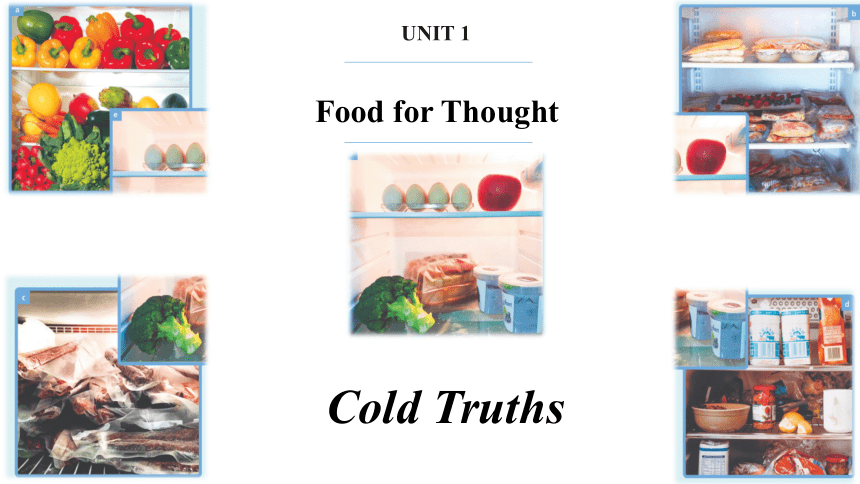 | |
| 格式 | pptx | ||
| 文件大小 | 24.8MB | ||
| 资源类型 | 教案 | ||
| 版本资源 | 外研版(2019) | ||
| 科目 | 英语 | ||
| 更新时间 | 2025-07-28 13:16:52 | ||
图片预览

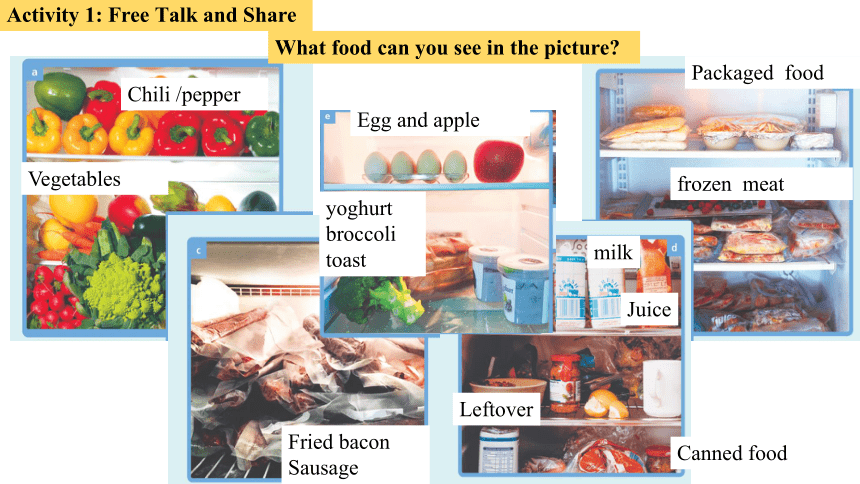
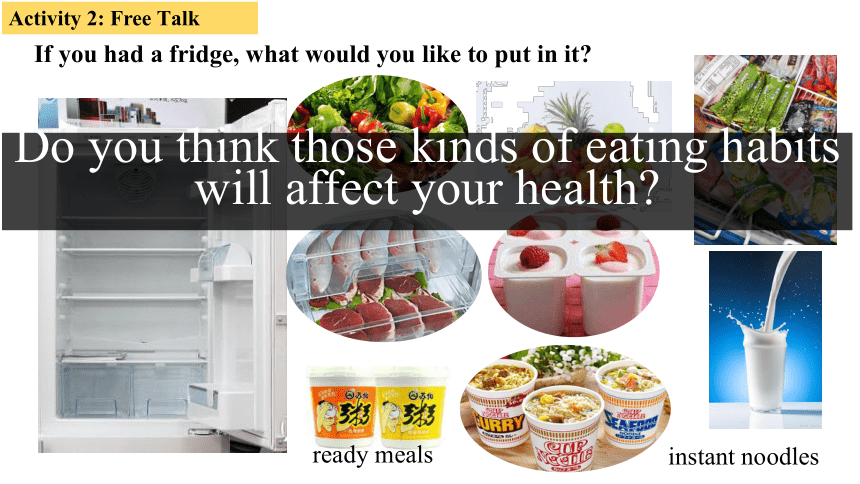
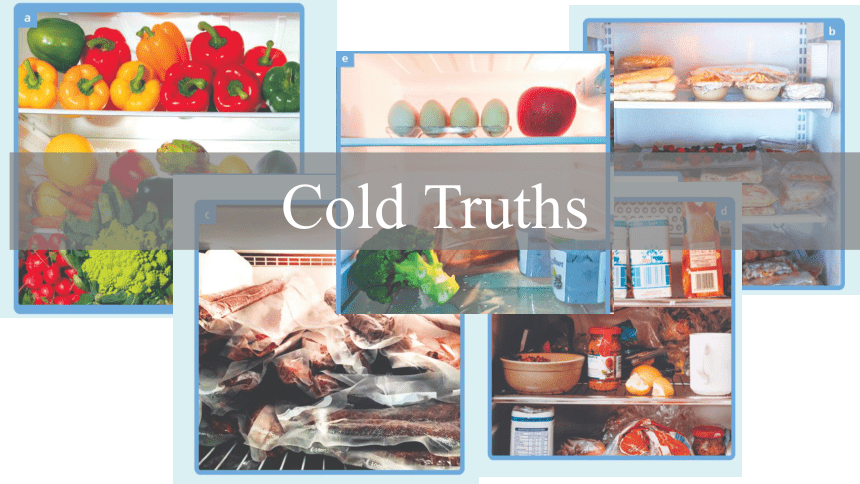
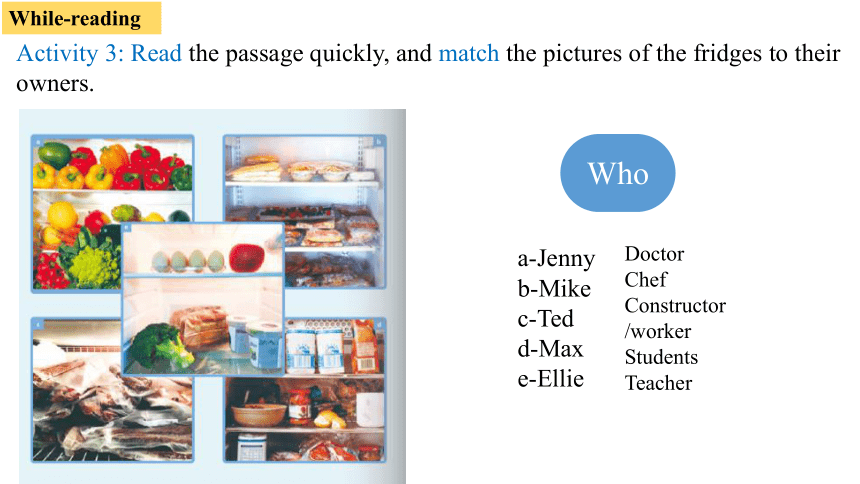
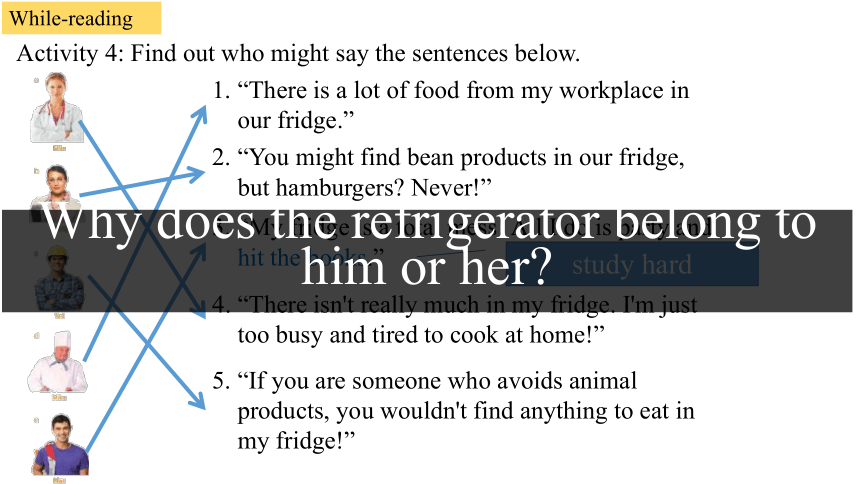
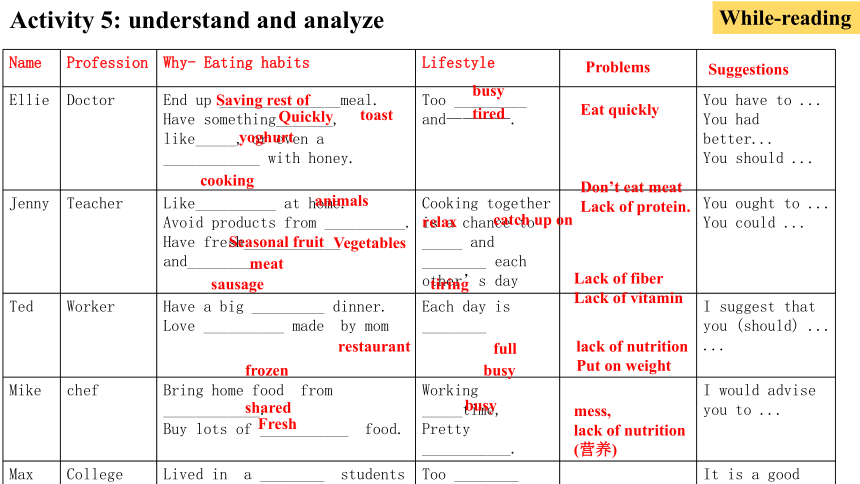
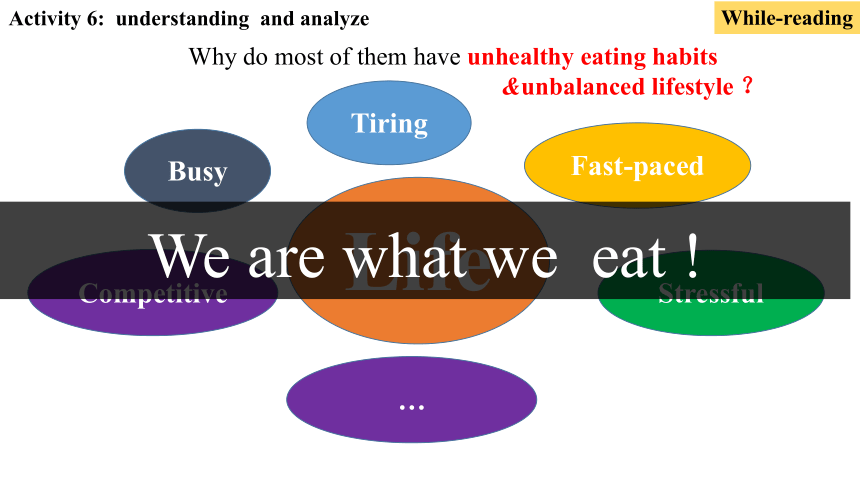
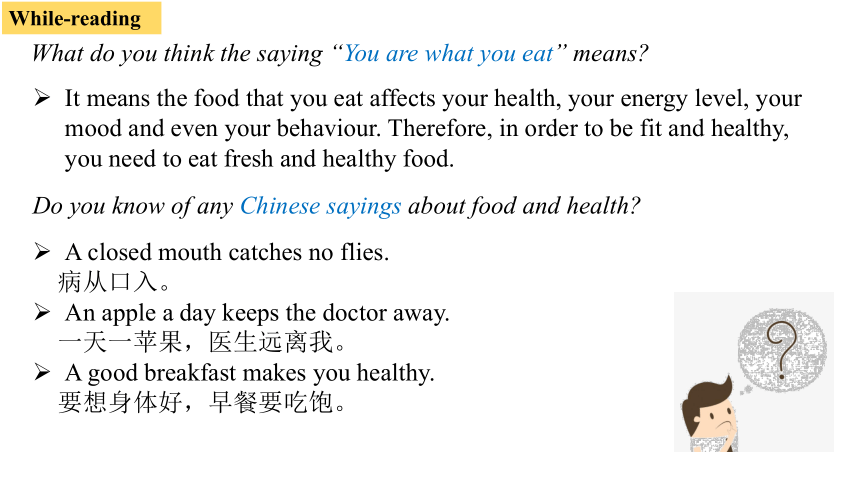
文档简介
(共25张PPT)
UNIT 1
Food for Thought
Cold Truths
Activity 1: Free Talk and Share
What food can you see in the picture
Chili /pepper
Vegetables
Packaged food
frozen meat
Fried bacon
Sausage
Canned food
milk
Juice
Leftover
Egg and apple
yoghurt
broccoli
toast
Activity 2: Free Talk
If you had a fridge, what would you like to put in it
ready meals
instant noodles
Do you think those kinds of eating habits will affect your health
Cold Truths
While-reading
Activity 3: Read the passage quickly, and match the pictures of the fridges to their owners.
a-Jenny
b-Mike
c-Ted
d-Max
e-Ellie
Who
Doctor
Chef
Constructor /worker
Students
Teacher
While-reading
Activity 4: Find out who might say the sentences below.
1. “There is a lot of food from my workplace in
our fridge.”
2. “You might find bean products in our fridge,
but hamburgers Never!”
3. “My fridge is a total mess! All I do is party and
hit the books.”
4. “There isn't really much in my fridge. I'm just
too busy and tired to cook at home!”
5. “If you are someone who avoids animal
products, you wouldn't find anything to eat in
my fridge!”
study hard
Why does the refrigerator belong to him or her
Activity 5: understand and analyze
Name Profession Why- Eating habits Lifestyle
Ellie Doctor End up _______________meal. Have something_______, like_____, or even a ____________ with honey. Too _________ and————. You have to ...
You had better...
You should ...
Jenny Teacher Like__________ at home. Avoid products from __________. Have fresh____________ and_________ Cooking together is a chance to _____ and ________ each other’s day You ought to ...
You could ...
Ted Worker Have a big _________ dinner. Love __________ made by mom Each day is ________ I suggest that you (should) ...
...
Mike chef Bring home food from ____________. Buy lots of ___________ food. Working _____time, Pretty ___________. I would advise you to ...
Max College students Lived in a ________ students house, Hardly buy___________ food Too ________ studying and meet friends It is a good idea that
Saving rest of
Quickly
toast
yoghurt
cooking
animals
Seasonal fruit
Vegetables
meat
sausage
restaurant
frozen
shared
Fresh
busy
tired
relax
catch up on
tiring
full
busy
busy
Eat quickly
mess,
lack of nutrition
(营养)
lack of nutrition
Put on weight
Lack of fiber
Lack of vitamin
Don’t eat meat
Lack of protein.
Problems
Suggestions
While-reading
Why do most of them have unhealthy eating habits
&unbalanced lifestyle ?
Life
Busy
Tiring
Fast-paced
Stressful
Competitive
…
We are what we eat !
Activity 6: understanding and analyze
While-reading
While-reading
What do you think the saying “You are what you eat” means
It means the food that you eat affects your health, your energy level, your mood and even your behaviour. Therefore, in order to be fit and healthy, you need to eat fresh and healthy food.
Do you know of any Chinese sayings about food and health
A closed mouth catches no flies.
病从口入。
An apple a day keeps the doctor away.
一天一苹果,医生远离我。
A good breakfast makes you healthy.
要想身体好,早餐要吃饱。
What is your lifestyle
What changes can you make to improve your lifestyles as senior high students
Activity 7:Think and Share
Post-reading
Post-reading
How to understand the title Cold Truths
The cold food in the fridge reflects their true life style.
The unhealthy eating habits and lifestyles will influence people‘s health, which is a cruel (adj.残酷的) truth.
Language points
本单元的标题“food for thought”也是双关语。food for thought是一个习语,本意指的是 “something that should be thought about or considered carefully”,意指“需要认真考虑的事情”。恰好,本单元主题是多元饮食文化和健康的饮食习惯,谈到了食物“food”,一语双关,意指我们应该认真对待自己摄入的食物。
Cold Truths
课文标题语带双关,“Cold Truths”原意是“冰冷的事实”,结合课文内容,可将标题理解为冰箱里冷冰冰的食物所反映出的真实生活方式。进一步拓展思维,也可以认为课文中展示的不良饮食习惯和生活方式终将影响人们的身体健康,这也是一个残酷的事实。因此这篇课文的意义在于呼吁人们形成良好的饮食和生活习惯。
Saying n. 谚语
As the saying goes
Put …to the test : 使..受考验
A healthy/simple lifestyle
You are what you eat: 人如其食
belong to sb.: to be owned by sb. 属于
belong to sth.: to be a member of sth. or to be a part of sth.
【注意】
belong to是不及物动词短语,无进行时态,无被动语态。
eg Who does this scarf belong to
He belongs to the golf club.
belonging n. (常用复数) 所有物,财产
Recognise:v. 认识,辨认出
recognition n. 认出,识别;承认
not enough room to swing a cat: (地方或空间)小的无法转身,是一种幽默说法,不定式短语to swing a cat作后置定语,修饰room。
end up: to find yourself in a place or situation that you did not intend or expect to be in
最终成为,最后处于
end up + doing sth. / adj.
eg. I ended up doing all the work myself.
If he carries on driving like that, he’ll end up dead.
【拓展】
end in: to have sth. as a result 以……为结果;以……结尾
Eg: The word I’m thinking of ends in ‘-ous’.
我想到的这个词是以ous结尾的。
-free 加在名词后构成形容词,表示:“没有…的”,“不含…的”
Trouble-free
Salt-free
Seasonal :adj 季节性的
时令果蔬。
catch up 打听;叙旧;追上,赶上
Bring up 抚养,养育
construction n. 建造,建筑
construct v. 建造,构筑
constructive adj. 有建设性的,积极的
under construction 在建造中
More or less 几乎,差不多,大约
satisfying adj. 令人满意的
satisfied adj. 满意的
satisfy v. 使满意
satisfaction n. 满意,满足
be satisfied with 对……感到满意
to one’s satisfaction 令人满意的是
否定词+比较级(表最高级)
双重否定表肯定
Beat v. 打败 homemade adj. 自制的
否定词与比较级连用还可以表示肯定的意思, 常见结构如下:
can’t/couldn’t +比较级,再……不为过
I can’t agree with you more. 我再同意你的意见不过了。(我完全同意你的意见。)
He couldn’t have done better.
no, never, nothing+比较级
This could give her no greater pleasure.
这使她再高兴不过了。(这使她非常高兴。)
I still don’t think that anything can beat my mum’s homemade sausages, though.
本句话的语序本应是:I still think that anything can not beat …。在这里使用了否定前置。当主语是第一人称且动词是表示心理活动的词,如think,expect,hope,believe等,要将后面从句中的否定词提前,构成否定前置。汉语翻译时,否定词要放回原来的位置。
Eg. I don’t believe he can solve it.
=I believe he cannot solve it.
Do a shop: 去采购
Ready food: 预制菜
Be busy doing sth: 忙于做某事
Learning to learn
Visual information, such as photos and illustrations, can support reading and help you identify the theme and content of a text. Make the most of these images to look for clues to help you understand the text.
adj. 视觉的
n. 插图,图解
v. 识别,认出
充分利用
寻找
n. 线索
人如饮食
属于
地方小得无法转身
时令果蔬
了解近况;叙旧
抚养;提出;呕吐
自己做决定
在建筑工地
You are what you eat.
belong to
There’s not enough room to swing …
seasonal fruit and vegetables
catch up on sth./with sb.
bring up
make one’s own choice(s)
at the construction site
Review
Review
或多或少
无肉不欢
做全职工作
充分利用
用功学习;准备功课
more or less
No meal is complete without some...
work full-time (adj./adv.)
make the most of/make the best of make full use of/take full advantage of
hit the books
UNIT 1
Food for Thought
Cold Truths
Activity 1: Free Talk and Share
What food can you see in the picture
Chili /pepper
Vegetables
Packaged food
frozen meat
Fried bacon
Sausage
Canned food
milk
Juice
Leftover
Egg and apple
yoghurt
broccoli
toast
Activity 2: Free Talk
If you had a fridge, what would you like to put in it
ready meals
instant noodles
Do you think those kinds of eating habits will affect your health
Cold Truths
While-reading
Activity 3: Read the passage quickly, and match the pictures of the fridges to their owners.
a-Jenny
b-Mike
c-Ted
d-Max
e-Ellie
Who
Doctor
Chef
Constructor /worker
Students
Teacher
While-reading
Activity 4: Find out who might say the sentences below.
1. “There is a lot of food from my workplace in
our fridge.”
2. “You might find bean products in our fridge,
but hamburgers Never!”
3. “My fridge is a total mess! All I do is party and
hit the books.”
4. “There isn't really much in my fridge. I'm just
too busy and tired to cook at home!”
5. “If you are someone who avoids animal
products, you wouldn't find anything to eat in
my fridge!”
study hard
Why does the refrigerator belong to him or her
Activity 5: understand and analyze
Name Profession Why- Eating habits Lifestyle
Ellie Doctor End up _______________meal. Have something_______, like_____, or even a ____________ with honey. Too _________ and————. You have to ...
You had better...
You should ...
Jenny Teacher Like__________ at home. Avoid products from __________. Have fresh____________ and_________ Cooking together is a chance to _____ and ________ each other’s day You ought to ...
You could ...
Ted Worker Have a big _________ dinner. Love __________ made by mom Each day is ________ I suggest that you (should) ...
...
Mike chef Bring home food from ____________. Buy lots of ___________ food. Working _____time, Pretty ___________. I would advise you to ...
Max College students Lived in a ________ students house, Hardly buy___________ food Too ________ studying and meet friends It is a good idea that
Saving rest of
Quickly
toast
yoghurt
cooking
animals
Seasonal fruit
Vegetables
meat
sausage
restaurant
frozen
shared
Fresh
busy
tired
relax
catch up on
tiring
full
busy
busy
Eat quickly
mess,
lack of nutrition
(营养)
lack of nutrition
Put on weight
Lack of fiber
Lack of vitamin
Don’t eat meat
Lack of protein.
Problems
Suggestions
While-reading
Why do most of them have unhealthy eating habits
&unbalanced lifestyle ?
Life
Busy
Tiring
Fast-paced
Stressful
Competitive
…
We are what we eat !
Activity 6: understanding and analyze
While-reading
While-reading
What do you think the saying “You are what you eat” means
It means the food that you eat affects your health, your energy level, your mood and even your behaviour. Therefore, in order to be fit and healthy, you need to eat fresh and healthy food.
Do you know of any Chinese sayings about food and health
A closed mouth catches no flies.
病从口入。
An apple a day keeps the doctor away.
一天一苹果,医生远离我。
A good breakfast makes you healthy.
要想身体好,早餐要吃饱。
What is your lifestyle
What changes can you make to improve your lifestyles as senior high students
Activity 7:Think and Share
Post-reading
Post-reading
How to understand the title Cold Truths
The cold food in the fridge reflects their true life style.
The unhealthy eating habits and lifestyles will influence people‘s health, which is a cruel (adj.残酷的) truth.
Language points
本单元的标题“food for thought”也是双关语。food for thought是一个习语,本意指的是 “something that should be thought about or considered carefully”,意指“需要认真考虑的事情”。恰好,本单元主题是多元饮食文化和健康的饮食习惯,谈到了食物“food”,一语双关,意指我们应该认真对待自己摄入的食物。
Cold Truths
课文标题语带双关,“Cold Truths”原意是“冰冷的事实”,结合课文内容,可将标题理解为冰箱里冷冰冰的食物所反映出的真实生活方式。进一步拓展思维,也可以认为课文中展示的不良饮食习惯和生活方式终将影响人们的身体健康,这也是一个残酷的事实。因此这篇课文的意义在于呼吁人们形成良好的饮食和生活习惯。
Saying n. 谚语
As the saying goes
Put …to the test : 使..受考验
A healthy/simple lifestyle
You are what you eat: 人如其食
belong to sb.: to be owned by sb. 属于
belong to sth.: to be a member of sth. or to be a part of sth.
【注意】
belong to是不及物动词短语,无进行时态,无被动语态。
eg Who does this scarf belong to
He belongs to the golf club.
belonging n. (常用复数) 所有物,财产
Recognise:v. 认识,辨认出
recognition n. 认出,识别;承认
not enough room to swing a cat: (地方或空间)小的无法转身,是一种幽默说法,不定式短语to swing a cat作后置定语,修饰room。
end up: to find yourself in a place or situation that you did not intend or expect to be in
最终成为,最后处于
end up + doing sth. / adj.
eg. I ended up doing all the work myself.
If he carries on driving like that, he’ll end up dead.
【拓展】
end in: to have sth. as a result 以……为结果;以……结尾
Eg: The word I’m thinking of ends in ‘-ous’.
我想到的这个词是以ous结尾的。
-free 加在名词后构成形容词,表示:“没有…的”,“不含…的”
Trouble-free
Salt-free
Seasonal :adj 季节性的
时令果蔬。
catch up 打听;叙旧;追上,赶上
Bring up 抚养,养育
construction n. 建造,建筑
construct v. 建造,构筑
constructive adj. 有建设性的,积极的
under construction 在建造中
More or less 几乎,差不多,大约
satisfying adj. 令人满意的
satisfied adj. 满意的
satisfy v. 使满意
satisfaction n. 满意,满足
be satisfied with 对……感到满意
to one’s satisfaction 令人满意的是
否定词+比较级(表最高级)
双重否定表肯定
Beat v. 打败 homemade adj. 自制的
否定词与比较级连用还可以表示肯定的意思, 常见结构如下:
can’t/couldn’t +比较级,再……不为过
I can’t agree with you more. 我再同意你的意见不过了。(我完全同意你的意见。)
He couldn’t have done better.
no, never, nothing+比较级
This could give her no greater pleasure.
这使她再高兴不过了。(这使她非常高兴。)
I still don’t think that anything can beat my mum’s homemade sausages, though.
本句话的语序本应是:I still think that anything can not beat …。在这里使用了否定前置。当主语是第一人称且动词是表示心理活动的词,如think,expect,hope,believe等,要将后面从句中的否定词提前,构成否定前置。汉语翻译时,否定词要放回原来的位置。
Eg. I don’t believe he can solve it.
=I believe he cannot solve it.
Do a shop: 去采购
Ready food: 预制菜
Be busy doing sth: 忙于做某事
Learning to learn
Visual information, such as photos and illustrations, can support reading and help you identify the theme and content of a text. Make the most of these images to look for clues to help you understand the text.
adj. 视觉的
n. 插图,图解
v. 识别,认出
充分利用
寻找
n. 线索
人如饮食
属于
地方小得无法转身
时令果蔬
了解近况;叙旧
抚养;提出;呕吐
自己做决定
在建筑工地
You are what you eat.
belong to
There’s not enough room to swing …
seasonal fruit and vegetables
catch up on sth./with sb.
bring up
make one’s own choice(s)
at the construction site
Review
Review
或多或少
无肉不欢
做全职工作
充分利用
用功学习;准备功课
more or less
No meal is complete without some...
work full-time (adj./adv.)
make the most of/make the best of make full use of/take full advantage of
hit the books
